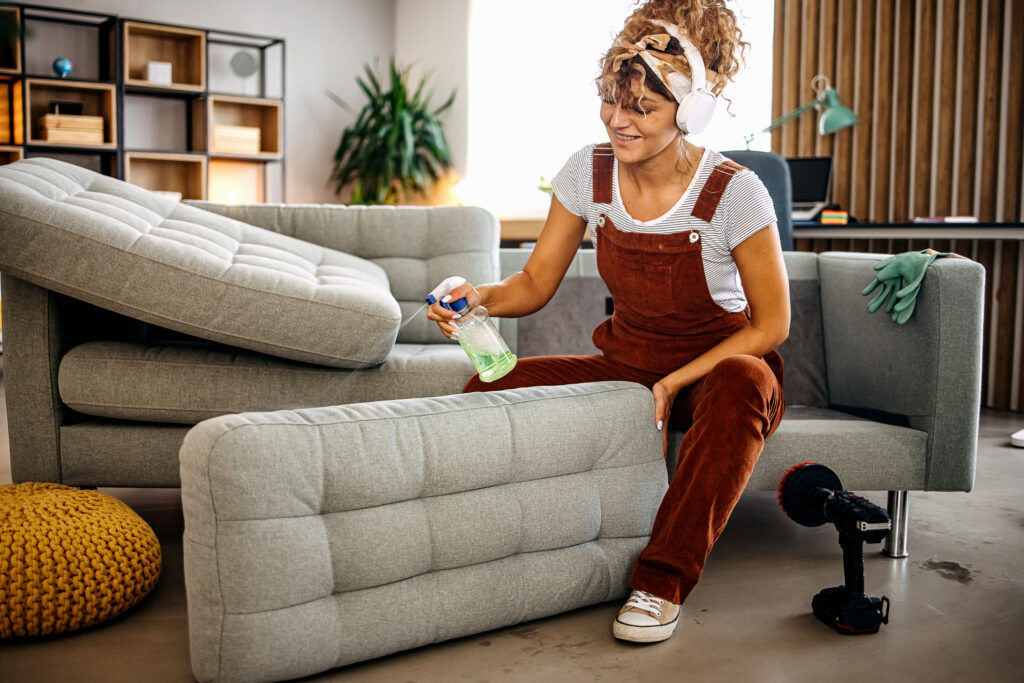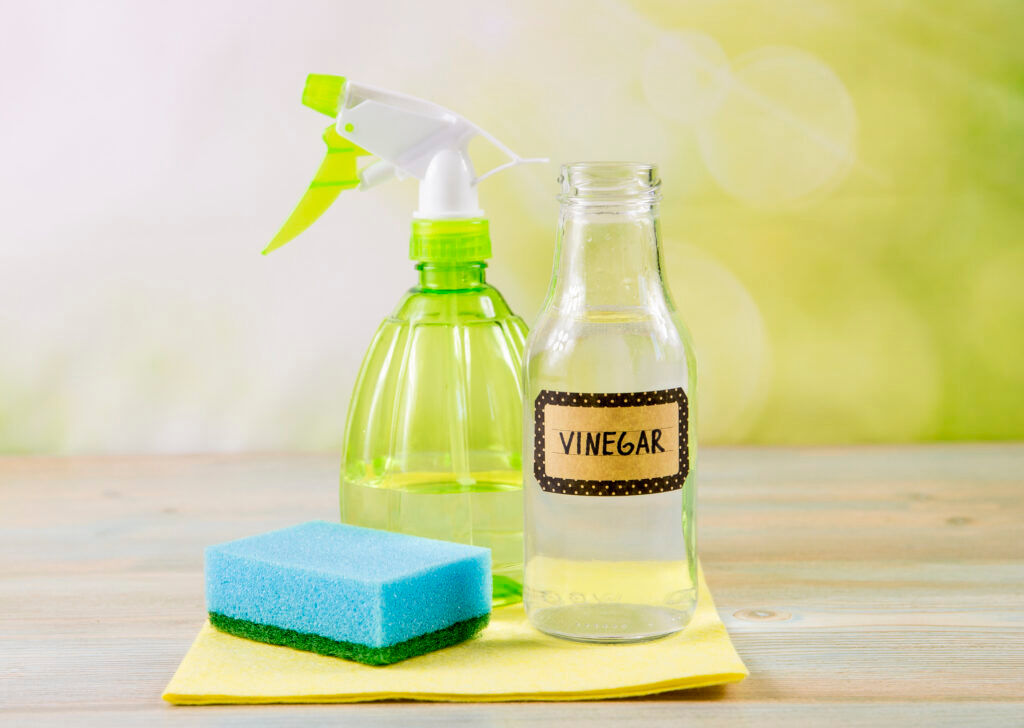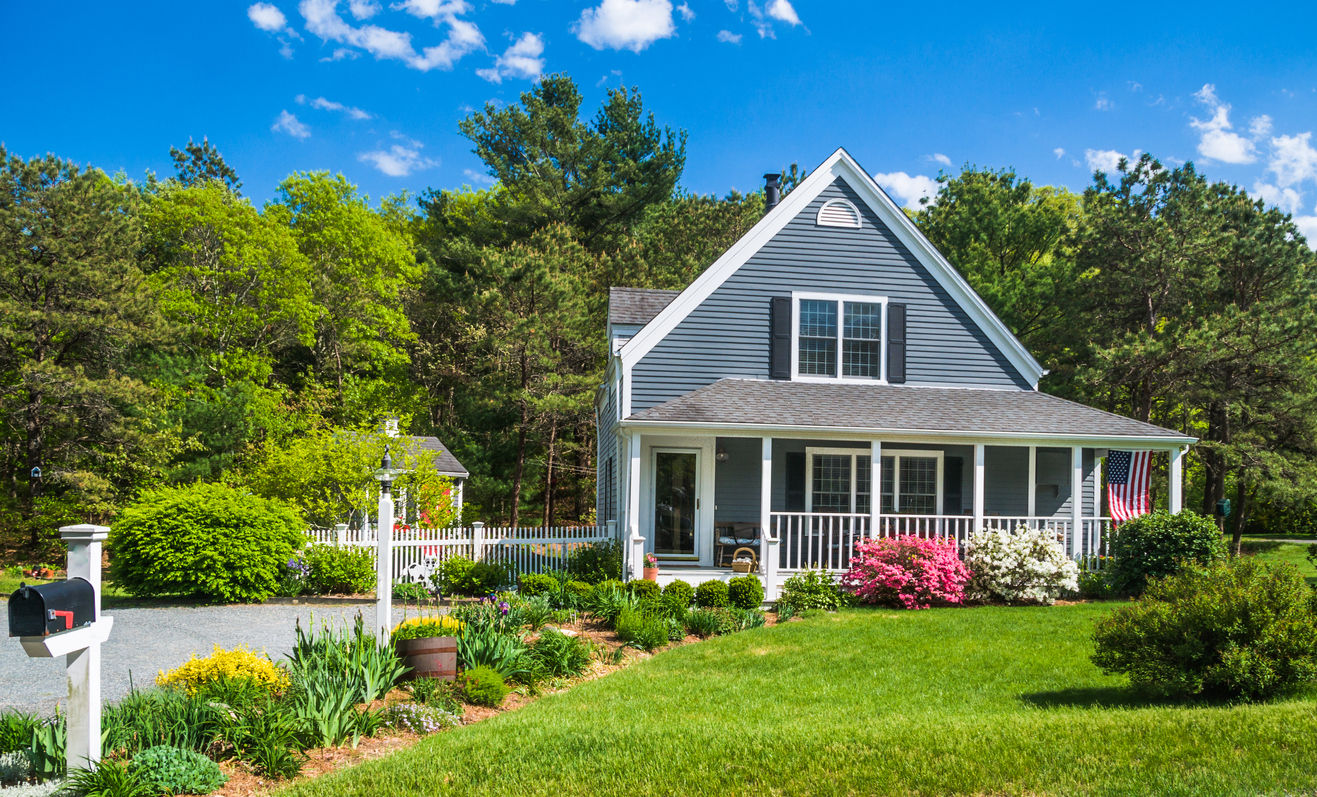How to Get Rid of an Old House Smell?

A bad odor in a home can make it significantly harder to sell. Smell is one of the strongest senses in the human body and is closely tied to emotion and memory. Stale odors, unpleasant smells, and other unwanted whiffs could drive away buyers or decrease the perceived value of your home.
Lingering smoke and tobacco smell can also significantly drop the value of your home. Researchers estimate that third-hand smoke reduces home values by up to 30%.
Homeowners preparing to sell need to directly address bad odors before listing. It’s not enough to disguise the smell with candles and diffusers, as buyers will realize that you are hiding something. Overpowering air freshener odors can also irritate the sinuses, further driving buyers away.
This guide will cover how to get rid of an old house smell and other unwanted odors. It will dive into specific causes that can be found in different rooms, while providing a variety of solutions.
Read on to discover everything you need to know to present a clean, neutral-smelling home to buyers.
What Causes Old House Smell?
Old house smell is often described as a stale or musty odor. The cause of the smell can vary from one house to the next, depending on the cause.
The first step in how to get rid of an old house smell is to identify the source. This way, you can directly address the issue instead of trying to mask it.
Here are a few common causes of old house smell.
Hidden Mold and Mildew
Unfortunately, one of the most common causes of a musty odor is mold or mildew. Mold releases microbial volatile organic compounds (mVOCs) that create a distinctive musty odor. Not only does this old house smell put off buyers, but it can also be a red flag that there is something unsafe in the house. Selling your home may be harder because the presence of mold can decrease property values by 10 to 30%.
Consider hiring a mold specialist to evaluate your home. They will look in common hiding spots behind walls, under carpets, in attics, and inside HVAC systems to see if there is any unwanted moisture. Remediating mold can eliminate a musty smell and prevent barriers to the home sale.
Trapped Moisture in Building Materials
Many old homes often have poor vapor barriers and inadequate ventilation, which causes moisture to become trapped in wood, drywall, and insulation. This chronic dampness creates the perfect environment for odor-causing bacteria and fungi, even without visible mold growth.
Excess moisture can also put off buyers. Even if there isn’t visible mold present, potential buyers may be concerned about its future development. Updating vapor barriers can eliminate odors ahead of your listing.
Decades of Absorbed Odors
Soft materials absorb odors over time. Your carpets, rugs, furniture, curtains, and other soft surfaces will hold on to pet odors and cooking smells longer than you expect. Even your own personal odor can become a part of your home’s general smell.
Consider investing in deep cleaning, with a focus on soft surfaces in your home. Deep carpet and rug cleaning can remove years of dirt, grime, and odors. You also might consider staging your house with new furniture that doesn’t smell like you.
Aging HVAC Systems
Your HVAC system may be pushing a musty smell through your home without you realizing it.
Old ductwork accumulates dust, dead skin cells, pet dander, and moisture over time. This organic matter becomes food for bacteria and mold, which then gets pushed through your house when you run your heating and air conditioning system.
If your HVAC system is in good condition, consider investing in duct cleaning. Not only will this ensure that you breathe fresh air in your own home, but it can also remove unpleasant odors that contribute to an old house smell.
Poor Ventilation and Stale Air
The source of an old house smell could be as simple as stagnant indoor air.
Without proper circulation or ventilation, air can become stale and musty. Consider running fans throughout the house and potentially investing in air purifiers. This will improve poor indoor air quality while eliminating an unwanted house smell.
Plumbing Issues and Sewer Gas
Sometimes a house smell goes deeper and can become rancid. This is usually an indicator that there is something wrong with the sewer or plumbing systems. Dried-out P-traps, cracked sewer lines, or failing wax rings on toilets can allow sewer gas to seep into living spaces. This creates a distinct rotten egg or sulfur smell.
The cost and complexity of repairing these issues vary depending on the cause. Fixing a dried-out P-trap can be as simple as pouring water down the drain. However, more complex sewer issues could be costly. This is another instance where making preventative repairs can streamline the home sale process.

How to Get Rid of Old House Smell
Once you identify the cause of the old house smell, you can take steps to remove it. While some people might recommend DIY solutions like sprinkling baking soda or infusing the air with essential oils, some causes might need professional intervention. You want to eliminate odors entirely, so you are not worried about the old house smell throughout the sale process.
“Deep cleaning, fresh paint, and improved ventilation are key. Neutralize odors at the source — don’t just cover them up — to make your home instantly more appealing. Work with a vendor that is able to remove almost any smells from the home.” – Mike Saladino, Keller Williams ONE Chicago.
Professional Mold Inspection and Remediation
A certified mold inspection costs around $670 in 2025. Following the inspection, remediation costs can range from $150 to nearly $3,000, . If the inspector finds mold, the average cost for remediation is around $3,500 in 2025. However, depending on where you live, the size of your home, and the severity of the mold, your remediation costs can range from $1,500 to nearly $10,000.
Professional remediation removes mold at the source, treats affected materials, and prevents regrowth. It addresses the root cause of the issue and provides documentation crucial for the home sale.
Deep Clean with Enzyme Cleaners
If you are looking into deep clean solutions, ask about enzyme cleaners. Biological enzyme cleaners break down odor molecules rather than masking them. You can either do this yourself by applying the cleaner to all surfaces, including walls, floors, and fabrics, or hire professionals to do this for you.
These cleaners are particularly effective on organic odors from pets, food, and human activity that have built up over the years.
HVAC System Overhaul
Professional air duct cleaning costs between $0.15 and $0.30 per square foot. Homeowners can expect to pay between $300 and $600 for a 2,000-square-foot house. The duct cleaning can remove years of accumulated debris that bacteria feed on.
You can also look into more preventative indoor air quality solutions, like installing higher-quality air filters and UV lights that are designed to kill mold and bacteria. Confirm that your air filters are MERV 13 or higher and maintain a monthly replacement schedule. This ensures they clean your air while preventing an unwanted old house smell.
Install Whole-House Dehumidification
One of the best ways to prevent musty smells in your house is to keep humidity levels below 60%. The target humidity levels for your home should fall between 30% and 50%. This will prevent it from feeling too damp or too dry.
If you live in an area with high humidity levels, or your house is moisture-prone, consider investing in a whole-house dehumidifier. This typically costs around $2,000 but can vary depending on the needs of your home. The dehumidifier integrates with your HVAC system and controls moisture levels year-round. It can actively target mold growth and an old house smell.
Seal and Prime All Surfaces
If you find that your fresh air efforts aren’t making a difference, you may need to repaint with odor-blocking primer. Products like Kilz Restoration create a barrier that seals in old odors and prevents them from re-emerging. Follow with high-quality paint. For concrete floors in basements, use a penetrating sealer before any floor coverings.
Odor-blocking primer is frequently used in homes of smokers. Often, you’ll need to follow up with a fresh coat of paint to fully get rid of the unwanted smell.
Air Purification
HEPA air purifiers with activated carbon filters can also be used to clean the air in your home. The HEPA filter removes particles while the activated carbon absorbs odor molecules. You can invest in portable air purifiers for target areas, like bathrooms or near the cat’s litter box, or you can look into whole-house coverage.
If you want air purification for your entire home, consult your local HVAC company.
Natural Odor Absorption
You can also look into natural ways to eliminate an old house smell. Spreading baking soda and using activated charcoal can help eat odors. Simply placing boxes of open baking soda in stuffy areas can make a noticeable difference.
Opting for natural odor removers will create better results and create a more natural smell in your home. This option is better than masking odors with candles and room sprays.

Room-by-Room Odor Solutions
One of the challenges of addressing lingering smells in a home is that the bad smells in each room have different causes. You may improve air circulation in a stuffy area only to discover that odor persists in another part of your home. It’s important to go from room to room to evaluate the air quality and odor of your space. Here’s a guide for targeting specific smells throughout your home.
Basement and Crawl Space Treatment
There are multiple ways to remove stale air from a basement or crawl space. Start by installing vapor barriers on dirt floors, sealing foundation cracks, and ensuring you have proper drainage in your house.
If you have poor ventilation in that area, run dehumidifiers or install exhaust fans that can move stale air around. These spaces are often the source of whole-house odor problems. A musty old house smell can start in the basement and rise to spread odors throughout the home.
Kitchen Deep Clean
The kitchen is also a common source of unwanted odors. Rotting food can start to smell as soon as mold spores grow, along with unemptied trash bins. The first step is to get to the source of the bad odor. If food leaked through a trash bag into your bin, bad smells may linger. You may need to wash your trash can or recycling bin to remove the smell. Lingering food in appliances or in between the cracks of cabinets can also create unwanted odors.
Conduct a kitchen deep clean that goes inside the appliances, especially in the refrigerators and along the dishwasher seals. It’s possible to deep clean your dishwasher with hot water, vinegar, and baking soda. You also want to degrease your range hood and exhaust fan. Some range hoods have filters that can be removed and run through the dishwasher.
Foul kitchen odors can also spread through the house. If you know a bad smell is coming from the kitchen, address it immediately.
Bathroom Moisture Control
The next place to look for unwanted odors is the bathroom. While a long shower with hot water can feel luxurious, it can also leave excess moisture in the bathroom that leads to mold and mildew in damp areas. Make sure your bathroom has proper air circulation with a working exhaust fan. You may be able to install timers to run the fan for a certain amount of time after each shower. This prevents moisture accumulation that leads to a musty mildew smell.
Also, check for sewer-like smells in your bathroom. This could be a simple issue, like a dried P-trap, or an indicator of a larger plumbing problem.
Sometimes, removing odors is as fast as removing the bathroom trash. This is a simple habit, but one that is easily forgotten.
Living Areas and Bedrooms
Finally, explore your living areas and bedrooms to see if there are any remaining odors. These smells usually come from soft surfaces like carpets, rugs, and curtains. Even pillows and beloved stuffed animals can pick up unwanted smells over time.
Some cleaning solutions might be easy. You may be able to wash a rug or throw some pillows in the washing machine. However, removing odors and other soft surfaces could be more complex. For example, you may need to hire a professional carpet cleaning company if your house lacks wood floors. Furthermore, if you’re trying to remove cigarette smoke, you may need to remove the carpet entirely.
If you have cleaned the soft surfaces in a room but the odor remains, try using air purifiers. If bad smells linger, you may need to wash or repaint the walls, along with replacing the flooring.
When to Call Professionals vs. DIY
You can decide whether you feel comfortable taking steps to neutralize odors on your own or hire a professional cleaning company. If you are simply eliminating mustiness from an old house, you might get the job done with deep cleaning, air purifiers, and a few drops of essential oil.
However, if you are dealing with mold remediation, serious odors, or mystery smells where you can’t locate the source, hiring a professional might be the best bet.
DIY-Appropriate Situations
Everyone has different comfort levels with attacking odors and cleaning their house. Here are a few signs that you can create an odor-free environment yourself without having to pay an outside contractor.
- There are surface-level odors from recent events. It’s easier to clean after one spill than to remediate several years of smoke from cigarettes.
- The target area is small. Most people can easily clean spaces under 500 square feet. If you need a whole-house deep clean, you may want to hire a professional company.
- There’s time for trial and error. While baking soda often works, it’s not the solution for everything. If you are able to test different solutions, you can clean up an area on your schedule.
Whenever you DIY odor elimination, make sure you’re getting to the root of the issue. You can make a room smell less musty, but the odor will return if the problem isn’t addressed.
Professional Help Required
Even if you’re a confident cleaner, there are some instances when you want to hire a professional. Here are a few indicators when you are better off hiring someone to assist with home odor elimination.
- There is visible mold. Spores can release harmful particles into the air. If you have to clean more than 10 ft of mold, hire a professional to remediate it for you.
- You notice negative health symptoms. It’s not uncommon to develop respiratory problems from breathing in mold and mildew. Stop inhaling these volatile organic compounds and hire someone to get rid of the mold and install proper ventilation.
- You want to sell your house quickly. If you don’t have time to experiment with vinegar spray and other DIY solutions, hire a company to clean your house so it smells its best.
- Your DIY attempts don’t work. If you have tried to clean your old house but don’t know what is causing the smell, bring in a professional.
Just like any other home project, you may want to seek out multiple quotes from different contractors. For example, prices on duct cleaning and replacement HVAC filters can vary from one company to another. Seeking out multiple quotes can ensure you don’t overpay for the work.

Work With a Real Estate Agent to Prepare Your Home for Sale
If you are in the process of removing odors from your home so you can sell it, hire a real estate agent who can give you an honest opinion about the smell and offer advice on how it can be removed. Experienced Realtors often have local contacts and can refer you to trusted companies that specialize in mold remediation, duct cleaning, deep cleaning, and other odor-eliminating strategies.
Whatever the cause of your old house smell, your agent can help you address it. They want to create a positive experience for potential buyers that can result in offers.
Turn to FastExpert to find a real estate agent in your area. You can read profiles of experienced Realtors and find one who is knowledgeable about your neighborhood and a good fit. FastExpert is one of the easiest and lowest-stress ways to hire a real estate professional. Take the first steps today to sell your house.





